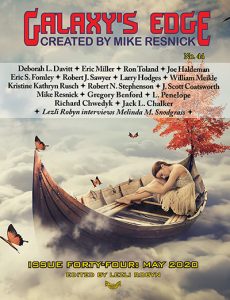Rich Horton Reviews Short Fiction: Pulp Literature, Interzone, Galaxy’s Edge, and Reckoning
 Pulp Literature Spring ’20
Pulp Literature Spring ’20
Interzone 5-6/20
Galaxy’s Edge 5/20
Reckoning 4
The latest issue of the increasingly interesting Canadian ‘zine Pulp Literature features an engaging story from Matthew Hughes, ”The Bicolour Spiral”, one of his stories about Erm Kaslo, an ”op” (private detective) in Hughes’ Jack Vance-derived science fantasy far-future setting. Kaslo is engaged by a woman to investigate her uncle’s murder because she is going to be tried for the crime. The murdered man was a very rich collector of a certain kind of rare alien pearl. As with many of Hughes’s mysteries, it’s entertainingly told in a decent pastiche of Vance’s style, setting up a complicated mystery and resolving it nicely, with sidetracks to describe the rather baroque society (and punishment regimen) of one of the planets in this distant future. They also present the results of a writing contest they sponsored, and I quite enjoyed the winner, ”Life4Sale” by Michael Donoghue, in which it is possible to trade lives with another person, keeping a negotiable set of memories of each life. The story is told via emails back and forth from two individuals negotiating such a trade… leading to a perhaps somewhat forced twist ending.
Interzone‘s May-June issue is an interesting one. John Possidente‘s ”The Transport of Bodies” is a slight if amusing mystery set on a space station that turns on the apparent murder of one member of a couple exploring a strangely dense planet. The solution is an old-fashioned one, used by Ben Bova and Myron Lewis, and by John Varley in an obscure early story. As I said, slight – but I enjoyed it.
Much better are the opening two pieces. ”Night-Town of Mars” by Tim lees is a weird novelette about a boy visiting his eccentric uncle. The uncle fancies himself an inventor – whether he really is or not is open to question, but his nephew appreciates the man’s eccentricity contrasted to the drone-like life he fears his schooldays presage. Then, somehow, as the uncle’s house is threatened with redevelopment, the boy and a version of his uncle find themselves fighting mannequins and evil overlords on what just might be Mars – weird stuff, but effective.
The pick story, though, is Eugenia Triantafyllou‘s ”Those We Serve”. Manoli is part of the summer staff on a tourist island, which we quickly come to understand means that he’s an illegal copy, an android perhaps, of a human who lives underground all year, while the summer and winter staff maintain the island and serve tourists. Manoli always waits for the visits of Amelia, a tourist who has been coming since her teenage years. But things are changing, and Manoli’s future is in doubt. I believed in his humanity, and the story won me over.
Galaxy’s Edge continues its editorial transition from the late Mike Resnick to Lezli Robyn: this issue, we are told, includes the last stories Resnick bought. As ever, they feature a number of reprints, and I ought to mention an exceptional Joe Haldeman piece, ”Four Short Novels”. Read it! The best of the new stories is ”One Hand and the Fiddler” by William Meikle, a ”weird Western,” set in what might be the future – who knows? – as the title characters come into town the same day the carnival comes. The carnival isn’t a normal carnival – instead it demonstrates some futuristic tech – and One Hand and the Fiddler (and, eventually, perhaps, our narrator) aren’t so sure the future is all it’s cooked up to be! I was reminded of Clifford Simak, of all people. Not a great story, but an interesting one.
Reckoning is an annual journal of creative writing on environmental justice. SF readers should recognize the Fiction/Nonfiction Editor, current Hugo nominee Arkady Martine. The magazine publishes a mix of poetry, non-fiction, and fiction, much of the latter science fiction. That said, science fiction certainly seems a natural tool to use to explore environmental issues. This issue I really enjoyed Fran Wilde‘s ”Happenstance”, which is a 2017 reprint from an obscure (to me, anyway) anthology called Futurescapes: Cities of Empowerment. Wilde’s story is excellent, about Lane, who programs ”happenstances” into an intriguingly designed future city. These are intended to increase random encounters, to enrich city life – but the story turns on the possibility that the tech could be used for evil, and on Lane’s concern that her boyfriend (and boss) might be selling the tech to a man with sinister plans. Another fine story is ”Thank You for Your Patience” by Rebecca Campbell, about Mark, who does tech service for a big corporation. It portrays a ruined near future (plague (sound familiar?), horrible pollution, a major earthquake, violence) filtered through his phone contacts, which are interrupted by what might be another disaster.
Recommended Stories
”Thank You For Your Patience”, Rebecca Campbell, (Reckoning 4)
”The Bicolour Spiral”, Matthew Hughes (Pulp Literature Spring ’20)
”Those We Serve”, Eugenia Triantafyllou (Interzone 5-6/20)
“Happenstance”, Fran Wilde (Futurescapes: Cities of Empowerment; Reckoning 4)
Rich Horton works for a major aerospace company in St. Louis MO. He has published over a dozen anthologies, including the yearly series The Year’s Best Science Fiction and Fantasy from Prime Books, and he is the Reprint Editor for Lightspeed Magazine. He contributes articles and reviews on SF and SF history to numerous publications.
This review and more like it in the August 2020 issue of Locus.
©Locus Magazine. Copyrighted material may not be republished without permission of LSFF.
 While you are here, please take a moment to support Locus with a one-time or recurring donation. We rely on reader donations to keep the magazine and site going, and would like to keep the site paywall free, but WE NEED YOUR FINANCIAL SUPPORT to continue quality coverage of the science fiction and fantasy field.
While you are here, please take a moment to support Locus with a one-time or recurring donation. We rely on reader donations to keep the magazine and site going, and would like to keep the site paywall free, but WE NEED YOUR FINANCIAL SUPPORT to continue quality coverage of the science fiction and fantasy field.








